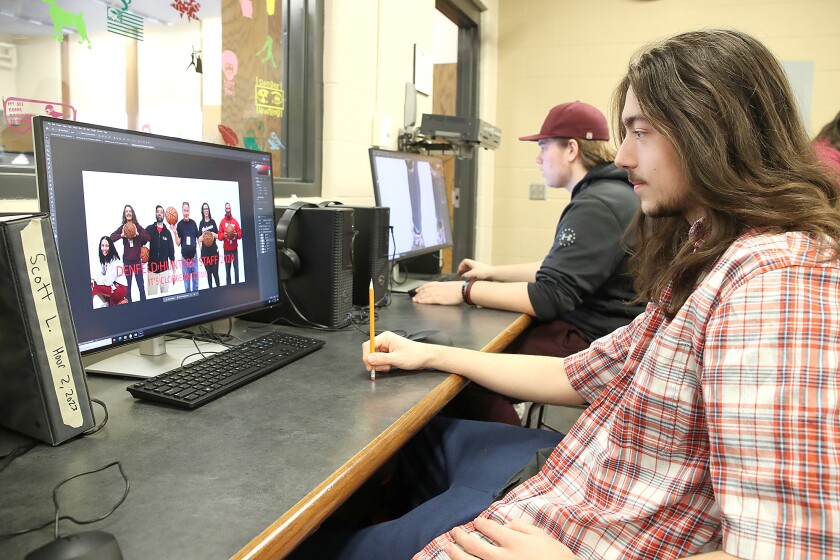DULUTH — For the second time in less than a year, the city's public school district is turning to voters to seek support for a referendum that would bring in $5.2 million annually for 10 years to support technology, security, digital curriculum and career and technical education. The levy will be the only question on the ballot in the special election set for May 14.
This referendum comes after a similar referendum question failed last fall by just 289 votes. Another similar referendum question about funding technology failed by 1,400 votes in 2018.
Why go out again so quickly?
"We were able to narrow that margin from 2018," said Simone Zunich, director of business services for Duluth Public Schools. "We also heard from community members that they didn't know much about what the technology funds would be used for, and we recognized a need to do a better job of communicating those goals to our voters."
But in a year with a highly anticipated election happening in November, why not wait and put the question on that ballot?
ADVERTISEMENT
According to Zunich and Superintendent John Magas, there's a fear of the message getting lost in the noise.
There's also the factor of school district funding cycles. Every year by June 30, the School Board must vote on, and the district must submit to the state, a final budget for the financial year ahead. If the referendum passes in May, it will not be applied to the budget until 2026. If the referendum were held in November, according to board member Rosie Loeffler-Kemp, it would limit the board's ability to plan ahead.
Already, the board is looking at cuts they'll have to make next year and the year due to budget impacts such as the end of the federal government's Elementary and Secondary School Emergency Relief fund dollars, increasing costs from inflation, a potential decline in enrollment and unfunded mandates from the state.
Zunich has recommended a two-phase plan for the budget that makes minor adjustments in 2024-25 then possibly greater budget changes needed in 2025-26. While the referendum wouldn't directly impact the overall budget as it is earmarked for technology needs, it would help free up some funds dedicated to tech.
The district's current technology budget is approximately $250,000, which Magas previously described as being pieced together from various funds and not enough to keep up with increasing technology demands.
What are the increasing technology needs?
Increasing cybersecurity is a large one according to Bart Smith, technology manager for the district.
"School districts are one of the number one targets for cybersecurity ransomware and malware attacks across the country," Smith said. "You hear about districts like Minneapolis and Rochester getting hit, even as close as Cloquet. Five years ago, this was hardly on our radar. Today, we're a major target for attackers looking to make a profit."
Smith said the district commonly sees attacks on its firewall and attempts to steal credentials to try and get info about families to scam them or to hold the system ransom.
ADVERTISEMENT
Physical safety is also a huge concern, as many of the buildings have cameras that are 17 years old. Smith also noted that many of the buildings have dense structures that block cellphone signals and that he'd like to put in additional cell coverage boosters to ensure staff can reach out no matter where they are in the buildings.
On the educational side, Peter Graves, educational technology and innovation coordinator with the district as well as a former math teacher for 35 years, said the district is also finding ways to help staff use technology in their classrooms in unique ways.
"I was the second person to get a smart board in my classroom, and it allowed me to change the way I taught," Graves said. "I could take a 3D model of something and illustrate the point I was making. I was able to teach with technology in a much better way than I could have even imagined when I first started out."
How would the referendum directly impact students?
There are a few ways, one being that about 10% of the funding would go towards the Career and Technical Education program to maintain and upgrade equipment. The program helps students get into careers in nursing, manufacturing, design and agriculture, which need equipment and software to function. But a lot of the equipment in the programs is outdated donations or not easily replaced due to expense.
Student Emma Schaub at East High School in the agriculture program cited needs such as a greenhouse irrigation system. Fellow East student Brenna Drinkwater noted that the nursing program has outdated blood pressure machines. CTE program director Dannette Seboe said if equipment can't be obtained via a grant, teachers often have to "MacGyver" a replacement or find a donation of an older model.
How much will this cost?
It depends on the homeowner. The district has provided a tool that allows homeowners to calculate the exact cost of the levy when applied to their taxes. Overall, the median home value of $315,000 will see a monthly tax increase of $10.87.
Further information on the Future Forward referendum can be found at futureforward709.org. Early voting via absentee ballot and in-person has already begun as of March 28 for this referendum. The special election will be held May 14.











